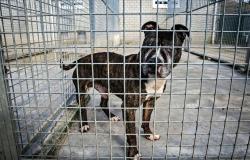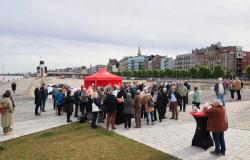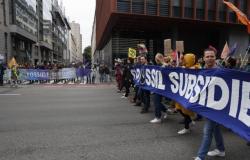Dairy farmers who voluntarily reduce their herd in the coming years should receive compensation for this. That is the most important measure in the plan that four sector organizations published on Tuesday evening. It should lead to less manure production in the Netherlands.
Since the tightening of European manure rules last year, Dutch livestock farming has had a large manure surplus, which has led to financial problems, especially for dairy farmers. Without measures, the sector fears a cold restructuring, in which a third of all dairy cows could disappear from the Netherlands.
Trade organization LTO Netherlands has therefore drawn up a crisis plan together with the young farmers of the Dutch Agricultural Youth Contact (NAJK), the organic dairy farmers of De Natuurweide, and the Dutch Dairy Organization (NZO), which represents the dairy industry. The House of Representatives will debate the manure policy on Thursday.
About the author
Maarten Albers is an economics reporter for de Volkskrant. He writes about agriculture and the food industry, among other things.
During that debate, the manure plan of outgoing Agriculture Minister Piet Adema (Christian Union) will be central. Earlier this month he proposed setting up a broad purchase scheme for livestock farmers. He also wants to introduce a grassland standard from 2028, which will set a maximum number of animals per hectare of grassland. That standard would become increasingly strict, to approximately three cows per hectare in 2032.
Phosphate rights
According to LTO, Adema’s measures offer insufficient prospects for the short term. The proposal for a grassland standard in particular was poorly received within the sector. It would mean that intensive livestock farms would have to cut back considerably.
In the sector’s proposal, the dairy herd will shrink next year, because dairy farmers will receive an annual compensation for every cow they surrender. It is expected that all livestock farmers will have to surrender phosphate rights by 2027, and will therefore reduce their herd or buy these rights from other livestock farmers. Dairy farmers who hand in cows in the coming years will be spared this discount so that they do not have to cut back again.
Two measures that the sector parties are adopting from Adema are a reduction in the protein content in cow feed and an increase in the skimming percentage in the trade in phosphate rights to 30 percent. The feeding measure was already proposed in 2020 to reduce nitrogen emissions from the sector, but was met with resistance from LTO, among others, and was ultimately withdrawn.
Increasing the skimming percentage is especially painful for young livestock farmers: they have to pay more for those rights when they want to expand their business. The NAJK proposes to spare young farmers.
Exceptional position
The sector parties also support the plan to buy out livestock farmers. The state should also purchase their land so that it can be made available to livestock farmers who want to continue farming. The package of measures should shrink the dairy herd by 15 to 20 percent.
The manure measures are necessary because the so-called derogation has been gradually phased out since last year. This exceptional position enabled Dutch dairy farmers to spread much more manure than is permitted elsewhere in Europe: not 170 kilograms of nitrogen per hectare, but 230 or even 250. Now that the exemption has expired, livestock farmers have to apply an increasing part of their manure at increasingly higher costs. have it removed.
In their plan, the organizations call their own proposals ‘very far-reaching and far-reaching’ but at the same time ‘insufficient’. In return, they demand that Brussels accommodate them. They want a new derogation that allows them to use 230 kilos of nitrogen per hectare until 2027. After that time, the introduction of fertilizer substitutes and national support measures should provide relief for farmers who want to continue. If the compensation from Brussels is not forthcoming, the measures will also be canceled.
No space
Agriculture Minister Adema has said several times that there is no room for a new derogation in Brussels. Patience with the Netherlands has run out, after years of broken promises regarding solving the manure problem and improving water quality. Moreover, it would benefit countries such as Poland, with a growing agricultural sector, if the Dutch livestock sector shrinks.
In the event that Adema again receives no response in Brussels, the sector parties propose that the Netherlands introduce a transitional arrangement itself. The European Commission could then impose fines or penalty payments against the Netherlands through an infringement procedure, which, according to Minister Adema, could amount to hundreds of millions of euros. Farmers could also have their European agricultural subsidies cut. But the parties think that the Netherlands has a strong legal position and ‘consider it unthinkable that the Commission will not lend a helping hand to the Netherlands’.
It is unclear how much support the sector plan can count on in the House of Representatives. The four forming parties were initially critical of Adema’s proposals, but VVD and NSC later announced that they saw the need for it. BBB and PVV are still against and have announced that they will come up with their own plan during Thursday’s debate.






